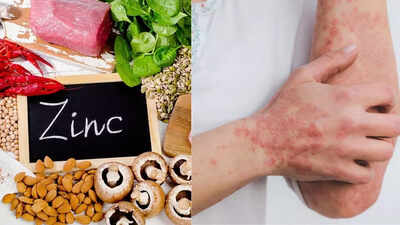Zinc is an essential mineral that plays a crucial role in keeping our skin healthy by supporting cell growth, controlling inflammation, and promoting wound healing. When the body lacks enough zinc, the effects often become visible on the skin first. A study titled Zinc and Skin Disorders highlights that common signs include dry, scaly patches, crusted rashes, hair loss, and slow-healing wounds. Some people inherit conditions that affect zinc absorption, while others develop deficiencies due to poor diet, chronic illness, or malnutrition. Recognizing these skin changes early is important because zinc supplementation or dietary improvements can often reverse the symptoms and restore healthy skin.
Skin symptoms linked to zinc deficiency
Dry, scaly patches around body openings Dry, rough, or scaly areas can appear around the mouth, hands, feet, and other openings. These patches are often accompanied by hair loss and sometimes digestive issues.Red, crusty rashes Reddish, crusted rashes may develop around the mouth, anus, hands, and feet. They can look similar to common skin irritations or contact dermatitis.Rashes due to nutrition issues Certain rashes caused by poor nutrition may appear like zinc deficiency-related skin changes, but often improve with zinc supplementation.Hair thinning or hair loss Zinc deficiency can lead to noticeable thinning hair or hair falling out, which usually reverses after supplementation.Slow-healing wounds Cuts, sores, or ulcers may take longer to heal because the skin’s repair processes slow down when zinc levels are low.
How zinc supports healthy skin
Zinc is involved in more than 1,000 enzymatic processes in the body, including those that maintain the health of keratinocytes, the main cells of the outer skin layer. It helps regulate inflammation, supports hair growth, and speeds up wound healing. Zinc also benefits Langerhans cells, which protect the skin from infections; fibroblasts, which help form the dermis; and melanocytes, which determine skin color. Without enough zinc, these functions are disrupted, leaving the skin vulnerable to rashes, slow healing, and hair loss.
Causes of zinc deficiency
Genetic mutations Certain disorders, like acrodermatitis enteropathica, Ehlers-Danlos syndrome, or transient neonatal zinc deficiency, impair zinc absorption or transport, leading to pronounced skin issues.Acquired deficiency Poor diet, chronic illness, alcoholism, and malabsorption can all reduce zinc levels, making the skin one of the first areas to show symptoms.Dysregulated zinc transport Even without low zinc intake, mutations or problems in zinc transport proteins in the skin can cause rashes, inflammation, and increased susceptibility to infections.
Remedies for zinc deficiency
Zinc supplements Oral or topical zinc supplements, when taken after consulting a doctor, often lead to noticeable improvement in rashes, hair growth, and wound healing.Dietary changes Eating zinc-rich foods like meat, seafood, nuts, seeds, and legumes can help maintain healthy skin and overall body function.Treating underlying conditions Addressing malabsorption, nutritional deficiencies, or genetic syndromes is important for long-term improvement.Early recognition and intervention Spotting skin changes early and confirming zinc deficiency allows for timely treatment, often reversing skin complications and restoring normal skin health.











